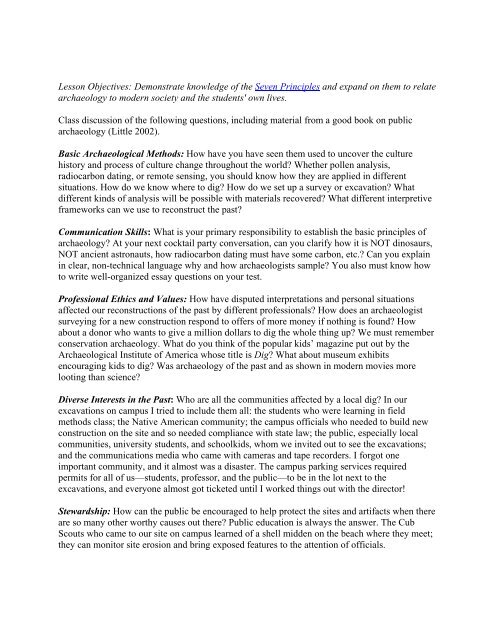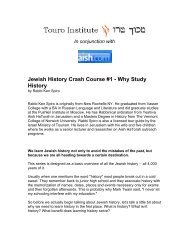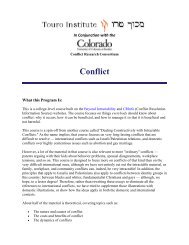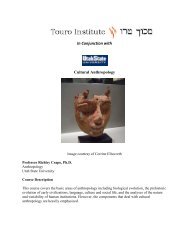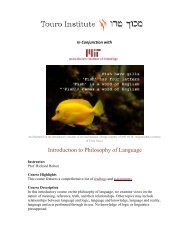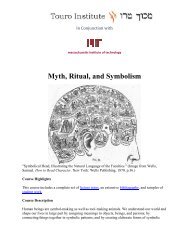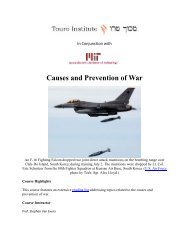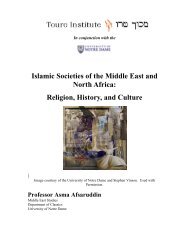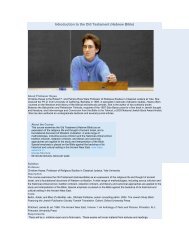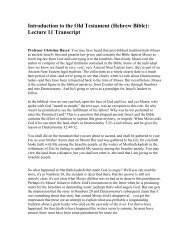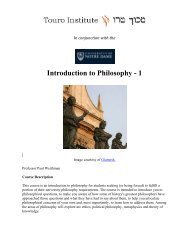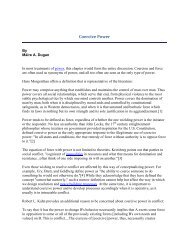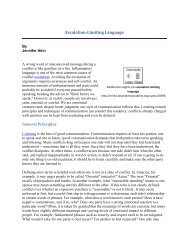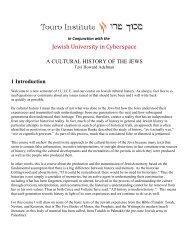INTRODUCTION TO ARCHAEOLOGY Nancy White - Touro Institute
INTRODUCTION TO ARCHAEOLOGY Nancy White - Touro Institute
INTRODUCTION TO ARCHAEOLOGY Nancy White - Touro Institute
You also want an ePaper? Increase the reach of your titles
YUMPU automatically turns print PDFs into web optimized ePapers that Google loves.
Lesson Objectives: Demonstrate knowledge of the Seven Principles and expand on them to relate<br />
archaeology to modern society and the students' own lives.<br />
Class discussion of the following questions, including material from a good book on public<br />
archaeology (Little 2002).<br />
Basic Archaeological Methods: How have you have seen them used to uncover the culture<br />
history and process of culture change throughout the world? Whether pollen analysis,<br />
radiocarbon dating, or remote sensing, you should know how they are applied in different<br />
situations. How do we know where to dig? How do we set up a survey or excavation? What<br />
different kinds of analysis will be possible with materials recovered? What different interpretive<br />
frameworks can we use to reconstruct the past?<br />
Communication Skills: What is your primary responsibility to establish the basic principles of<br />
archaeology? At your next cocktail party conversation, can you clarify how it is NOT dinosaurs,<br />
NOT ancient astronauts, how radiocarbon dating must have some carbon, etc.? Can you explain<br />
in clear, non-technical language why and how archaeologists sample? You also must know how<br />
to write well-organized essay questions on your test.<br />
Professional Ethics and Values: How have disputed interpretations and personal situations<br />
affected our reconstructions of the past by different professionals? How does an archaeologist<br />
surveying for a new construction respond to offers of more money if nothing is found? How<br />
about a donor who wants to give a million dollars to dig the whole thing up? We must remember<br />
conservation archaeology. What do you think of the popular kids’ magazine put out by the<br />
Archaeological <strong>Institute</strong> of America whose title is Dig? What about museum exhibits<br />
encouraging kids to dig? Was archaeology of the past and as shown in modern movies more<br />
looting than science?<br />
Diverse Interests in the Past: Who are all the communities affected by a local dig? In our<br />
excavations on campus I tried to include them all: the students who were learning in field<br />
methods class; the Native American community; the campus officials who needed to build new<br />
construction on the site and so needed compliance with state law; the public, especially local<br />
communities, university students, and schoolkids, whom we invited out to see the excavations;<br />
and the communications media who came with cameras and tape recorders. I forgot one<br />
important community, and it almost was a disaster. The campus parking services required<br />
permits for all of us—students, professor, and the public—to be in the lot next to the<br />
excavations, and everyone almost got ticketed until I worked things out with the director!<br />
Stewardship: How can the public be encouraged to help protect the sites and artifacts when there<br />
are so many other worthy causes out there? Public education is always the answer. The Cub<br />
Scouts who came to our<br />
site on campus learned of a shell midden on the beach where they meet;<br />
they can monitor site erosion and bring exposed features to the attention of officials.


